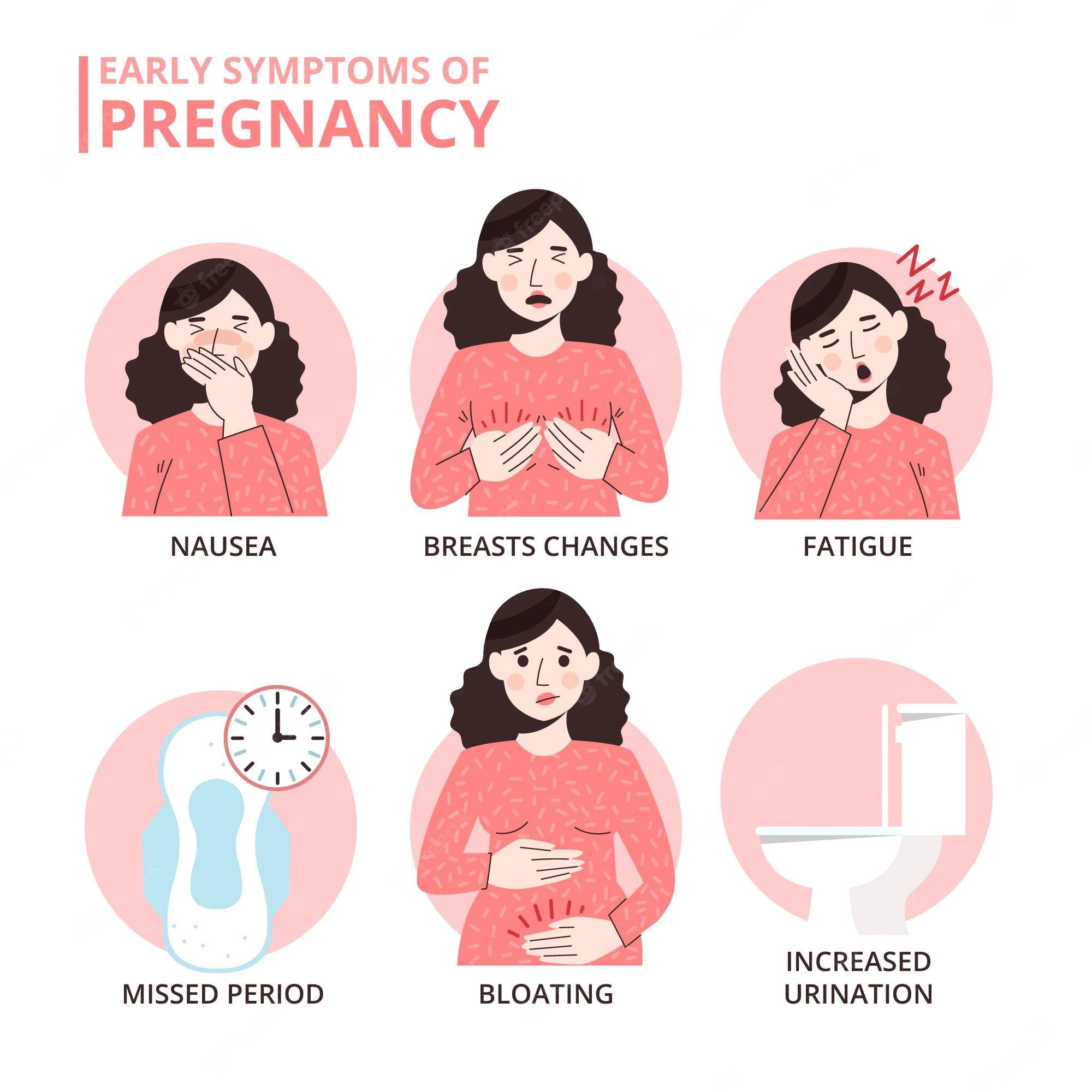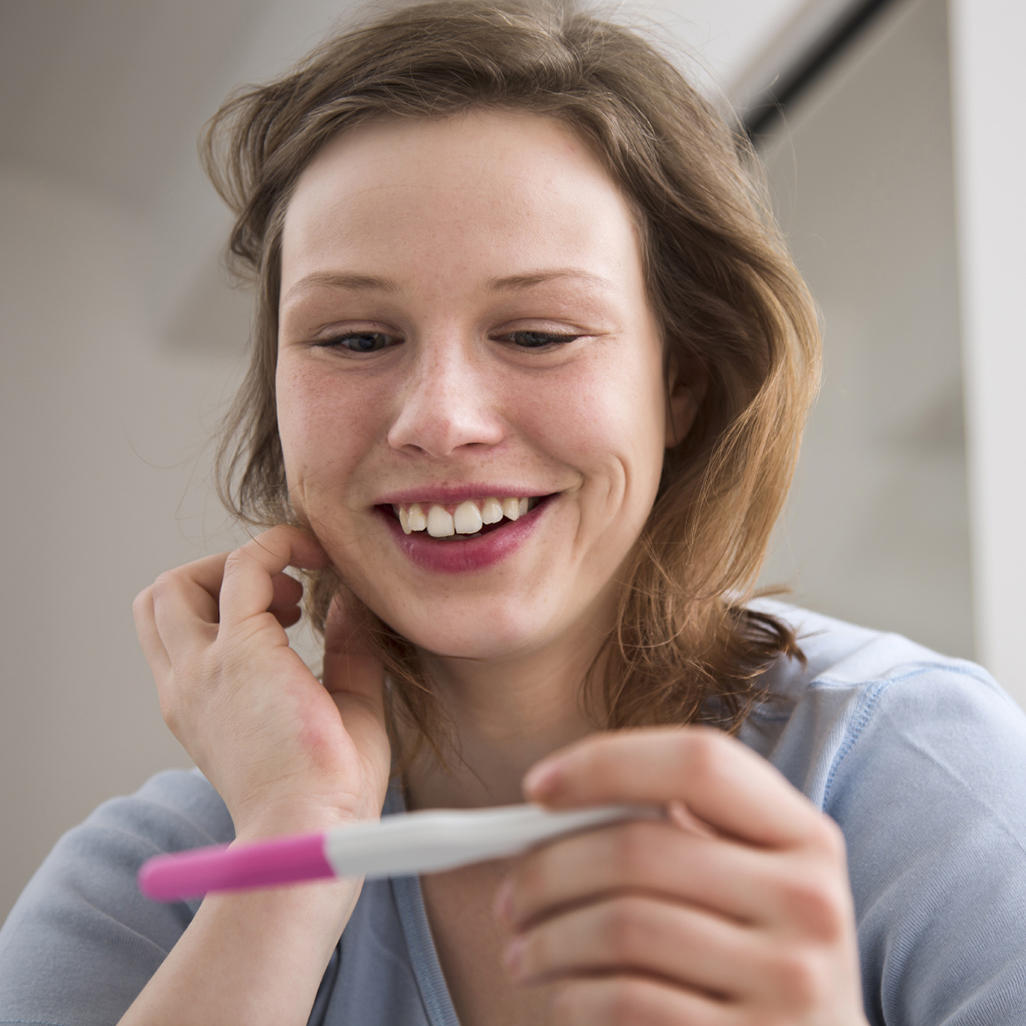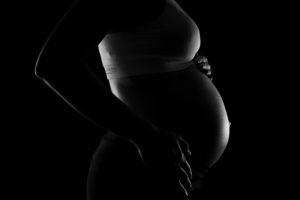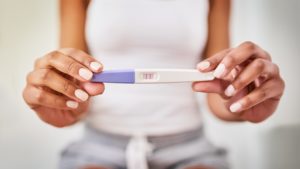
Absence of menstruation, morning sickness, mood changes, excessive tiredness, and an increased urge to urinate are the typical signs of pregnancy, which usually show after a few weeks. Other signs and symptoms of pregnancy can be seen in the early days of pregnancy, especially if the woman pays close attention to her own body.
Early Pregnancy Symptoms
There’s no mistaking that pregnancy is a huge change in your life. You’ll begin to experience all sorts of physical changes and mood swings, and you’ll be relying on your partner for support more than ever. However, as exciting as this time can be, there are also certain symptoms you may experience early on in your pregnancy that can be quite worrying. In this article, we’ll take a look at each week of pregnancy and explain what the typical symptoms are.
The first symptoms of pregnancy are:
1. Pink Vaginal Discharge
When the egg is fertilized, a tiny pink discharge may appear, which is actually a woman’s monthly discharge with traces of blood caused by the fertilized egg’s implantation in the uterus.
This discharge can occur as soon as a few minutes after intercourse or as late as three days later. This fluid is sometimes only visible when a lady goes to clean herself after urinating.
2. Thicker Discharge
Due to the massive hormonal changes that occur from the moment of conception, the discharge may thicken. This discharge does not have to be pink, and it is often yellowish in hue.
It is critical to see a gynecologist if this discharge is accompanied by a bad odor or symptoms such as pain or itching, as this could suggest a vaginal infection, particularly candidiasis. Recognize that changes in discharge can signal health issues.
3. Colic and/or Abdominal Swelling
Bloating in the abdomen is one of the first signs of pregnancy, usually developing during the first 7 and 2 weeks. The main reasons for abdomen swelling, which can be confused with moderate to medium severity menstrual cramps, are an increase in blood flow and adaptation to uterine expansion.
4. Easy Tiredness and/or Excessive Sleep
Tiredness is one of the most prevalent pregnancy symptoms that can occur at any time during the pregnancy, beginning around the second week. During the first 12 weeks of pregnancy, this weariness is normal as the body adjusts its entire metabolism to give the energy required for the baby’s development.
5. Sensitive Breasts and/or Darkening of The Areola
Due to the action of hormones that stimulate the mammary glands, a woman’s breasts may feel more sensitive in the first two weeks of pregnancy, preparing her for breastfeeding. There is also a rise in breast volume, and the mammary glands begin to grow to supply the baby’s demands after birth.
The lady may notice changes in the areolas, which tend to grow darker than normal due to increased blood flow in the region, in addition to increased sensitivity and size of the breasts.
6. Delay or Lack of Menstruation
The most visible symptom of pregnancy is missed menstruation, which occurs when a woman stops having her monthly period to allow the baby to develop normally in the uterus.
The rise in the synthesis of the beta hormone hCG causes this signal, which inhibits the ovaries from continuing to release mature eggs. Missed menstruation can happen up to four weeks after conception, and it’s easier to spot in women who have regular cycles.
7. Pain in The Lower Back
Although back pain is typically always associated with the later weeks of pregnancy, some women can experience it from the start, as a result of the changes that occur in the woman’s body in preparation for the birth of the baby.
Back pain can be mistaken for abdominal pains in some situations, leading some women to believe that menstruation is on the way. However, when they don’t get their period, they realize that it is, in fact, discomfort in the lower back that is unrelated to menstruation.
8. Aversion to Strong Smells
It is fairly normal for women to feel an aversion to strong fragrances, even if they appear to be pleasant, such as perfume, at the start of their pregnancy. Most pregnant women will vomit if they smell something strong, such as gasoline, cigarettes, or cleaning agents.
Furthermore, as the sense of smell is affected, some women may notice a change in the taste of their food, which becomes more powerful and sickening.
9. Mood Variations
A woman may have mood changes in the first two weeks of pregnancy for no obvious reason. It is highly usual for a pregnant woman to cry in situations that she would not have cried in before she became pregnant, and this symptom should last the entire pregnancy.
Because of the significant hormonal changes that occur during pregnancy, neurotransmitter levels might become unbalanced, making your mood more unpredictable.
10. Morning Sickness and/or Vomiting
Nausea and vomiting are typical pregnancy symptoms, especially in the morning, and are among the most well-known. They normally start during the 6th week of pregnancy and can remain throughout the pregnancy.
However, nausea does not necessarily have to be accompanied by vomiting, and sickness might come and go without the woman vomiting, particularly in the morning.
11. Craving for Strange Foods
Typical pregnancy cravings can begin as early as the first month of pregnancy and last throughout the pregnancy. It is usual for some women to crave strange foods, attempt new combinations, or even eat items they have never tasted before.
These desires, especially if they are for something quite different from what the lady normally consumes, may be related to nutritional deficits in some form of mineral or vitamin. In these cases, it’s best to see a doctor figure out what’s causing the problem.
12. Dizziness and Headache
Dizziness is a symptom of low blood pressure, low blood sugar, and a poor diet as a result of recurrent nausea and vomiting. They can appear as early as the first 5 weeks of pregnancy, but they start to fade after the 20th week.
Headache is also prevalent during pregnancy as a result of hormonal changes, although it is usually mild and persistent, and the woman may not even identify her suffering with her pregnancy.
13. Increased Urge to Urinate
The pregnant woman’s body needs to create several hormones, such as progesterone, as the pregnancy advances to ensure that the baby develops normally. When this happens, the bladder muscles relax, making it more difficult to completely clear the pee that has built up inside the bladder. As a result, the woman may feel the need to go to the bathroom more frequently.
14. Pimples and Oily Skin
Hormonal changes can cause the development or aggravation of blackheads and pimples, also known as acne, and as a result, a woman may notice an increase in skin oiliness after the first month of pregnancy, which can be addressed with the use of appropriate skincare and personal hygiene products.
Pregnancy Symptoms Week by Week

According to the week of pregnancy, the most common symptoms are:
First 7 days – 1st week
The symptoms during the first week of pregnancy are the most difficult to detect, and are usually only seen by women who are sensitive to minute changes in their own bodies:
- Pink vaginal discharge
- Thicker discharge
- Colic and abdominal bloating.
First 2 weeks
The following are some of the most common pregnancy symptoms that develop around the second week:
- Easy tiredness and excessive sleep
- Sensitive breasts and darkening of the areola
- Delay or lack of menstruation
- Pain in the lower back
- Aversion to strong smells
- Mood variations.
1st month of pregnancy
After the first month of pregnancy, when menstruation is delayed, many women begin to experience various symptoms, such as:
- Morning sickness and vomiting
- Craving strange foods
- Dizziness and headache
- Increased urge to urinate
- Pimples and oily skin.
What to do if You Suspect Pregnancy

If a pregnancy is suspected, the lady should take a pregnancy test at a drugstore, which can be done as early as the first day after the missed period. If the result is negative, wait for 3 to 5 days and then take another pregnancy test if your period is still late.
If the result is still negative, a blood test for pregnancy can be considered, as it is more reliable and indicates the amount of the Beta HCG hormone, which is created only during pregnancy. This exam can also tell you how far along you are in your pregnancy:
- 7 days after fertilization: up to 25 mIU/mL
- 4 weeks after Last Menstruation Date: 1,000 mIU/mL
- 5 weeks after Last Menstruation Date: 3,000 mIU/mL
- 6 weeks after Last Menstruation Date: 6,000 mIU/mL
- 7 weeks after Last Menstruation Date: 20,000 mIU/mL
- 8 to 10 weeks after Last Menstrual Date: 100,000 mIU/mL
However, if a drugstore pregnancy test is negative after 10 days of late menstruation, the lady is not pregnant and should see a doctor determine the cause of the missed period.
What to do if The Pharmacy Test is Positive
After verifying the pregnancy with a pharmacy urine test, it is recommended that you see a doctor for a pregnancy blood test, as this test measures the level of Beta HCG hormones and is more trustworthy.
When to do The Ultrasound
From the fifth week of pregnancy, the doctor can perform a transvaginal ultrasound to examine the gestational sac and determine whether the pregnancy is developing inside the uterus. Ectopic pregnancy, which occurs when a woman is pregnant but the baby develops in the tubes, is extremely dangerous and puts the woman’s life in jeopardy.
If the doctor hasn’t done an ultrasound between 8 and 13 weeks of pregnancy, he should request one to confirm the gestational age and when the baby should reach 40 weeks, which should be the predicted delivery date.
The baby is still extremely small and little may be seen during this check, but it is normally a very thrilling experience for the parents. It’s still too early to tell if the baby is a boy or a girl, but if the doctor suspects it’s a boy, it’s probably a boy. The gender of the baby will be verified in the second trimester of pregnancy, about 20 weeks.






